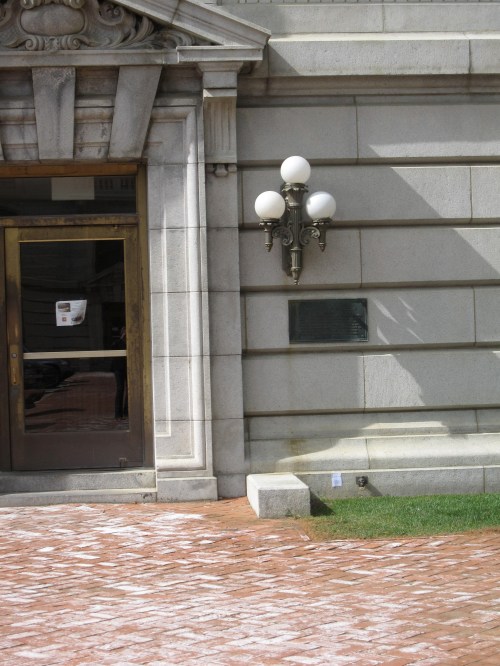
Hide-and-Seek, 1933
by Galway Kinnell
Once when we were playing
hide-and-seek and it was time
to go home, the rest gave up
on the game before it was done
and forgot I was still hiding.
I remained hidden as a matter
of honor until the moon rose.
I was in Annapolis for a sisters’ weekend, and after mass at the Naval Academy Chapel, I taped this little poem to Sampson Hall, home to the English and History departments. I love the Academy–my recently deceased father was a midshipman (he graduated in Jimmy Carter’s class) and taught physics there for 18 years. (I also have 2 gentle giant nephews who go there.)
My initial thought was that the midshipmen and women might enjoy this reminder of childhood. There’s absolutely nothing childish about the strapping young men I saw walking around Annapolis that weekend—spotless even on leave, and dang, they look handsome in the their Navy whites. Those uniformed middies are the most purposeful, serious group of college kids you’ll ever see. But the poem points out that childhood games are serious too, played with an earnestness we adults overlook when we use the phrase “child’s play” to signify unimportant work.
This was also the weekend of the annual St. John’s-Navy croquet match. St. John’s, a 226-year old college in Annapolis, is a perfect foil to the Academy. The students at St. John’s tend to be alternative, intellectual and not necessarily athletic. While the mids at the Academy are learning underwater acoustics, their counterparts are studying the Great Books and Greek. The croquet match, like Kinnell’s hide-and-seek game, is light-hearted at the outset, but the St. John’s team plays to win and usually does.
The more I thought about the poem at the Naval Academy, another idea caught my fancy: the idea of honor. Honor, for the child in the poem, is continuing to do what one has committed to even when it serves no purpose. Is that a childish notion, one we outgrow, or an honorable one? What is honorable for soldiers who no longer believe in the wars they fight in? Kinnell served in the Navy himself, and later became active in the civil rights movement (a cause my dad supported) and in the Vietnam War protests (one he did not).
My father loved the Navy, and served with honor, but he left after 15 years, in part because he didn’t agree with how the Navy was handling nuclear waste, an action which I consider most honorable.
Gee, that’s a lot of words for a 7-line poem.

One Comment